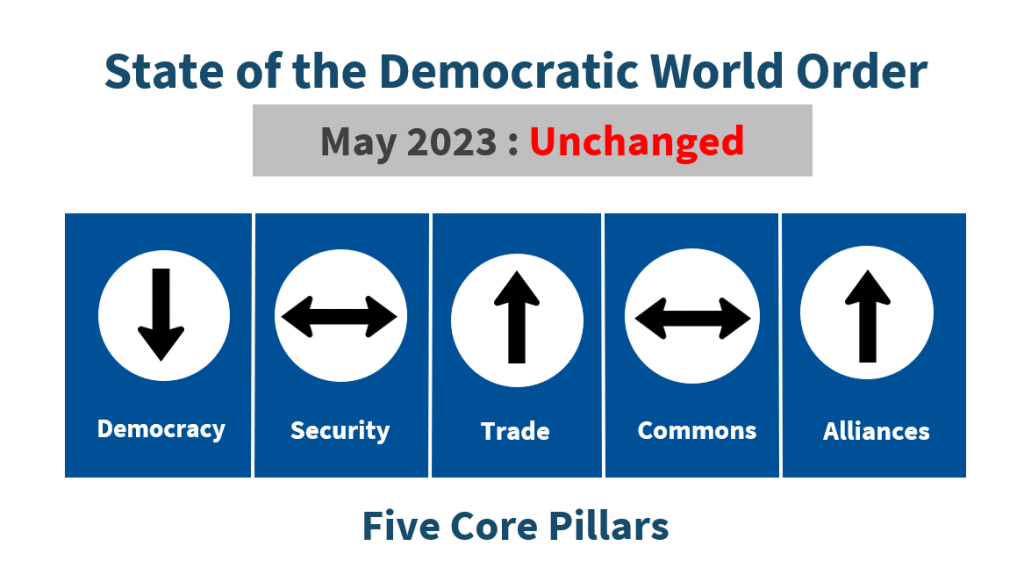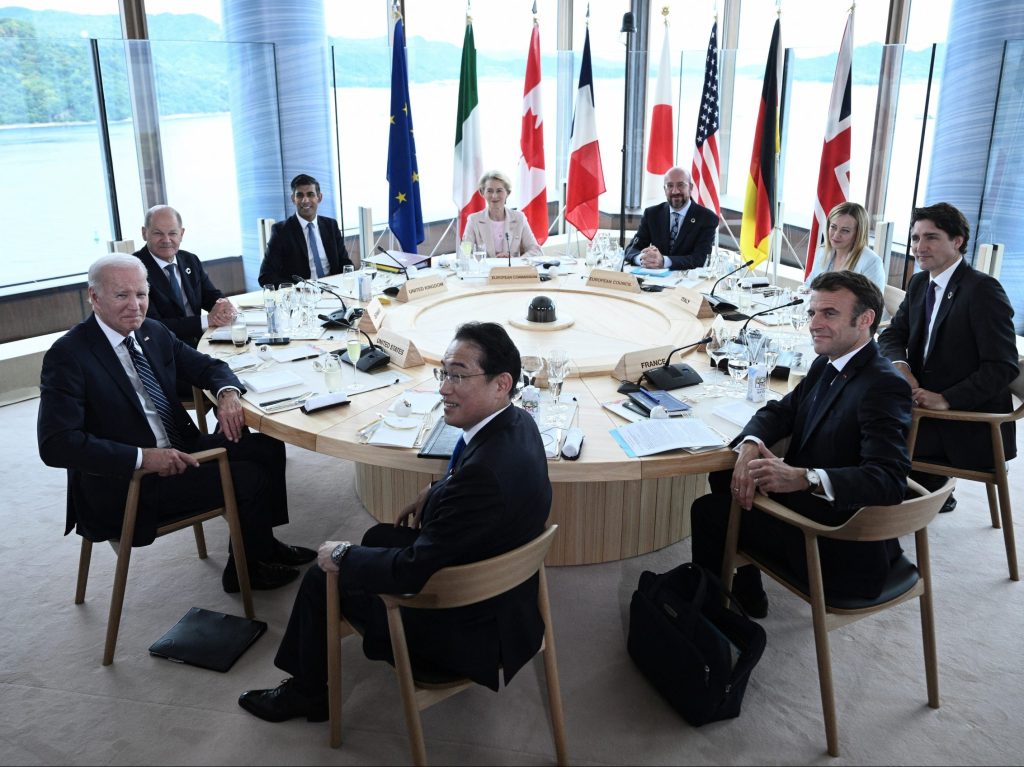Reshaping the order
This month’s topline events
G7 Unites on China. At a G7 summit meeting in Hiroshima, Japan, President Joe Biden and other democratic leaders came together on China, pledging to “derisk” without “decoupling” from China’s economy and agreeing on a coordinating mechanism to counter economic coercion and an initiative to diversify supply chains. The G7 also called out Beijing’s militancy in the Indo-Pacific and political interference in democracies, while making clear it was prepared to “build constructive and stable relations” with China. With European allies eager to calm tensions, Biden also indicated he expected a thaw in relations with Beijing, as US officials began a new round of bilateral meetings with their Chinese counterparts.
- Shaping the order. The summit’s success in projecting a common front on China could set the table for meaningful policy coordination between the US and its allies, particularly on economic issues. The prospects of a more unified approach appear to have garnered concern in Beijing, which summoned Japan’s ambassador to rebuke the G7’s effort to “smear and attack China.” But as highlighted by French President Emmanuel Macron’s recent visit to Beijing, the US and its allies still have a ways to go to coordinate efforts on engaging with the world’s second largest economy.
- Hitting home. America’s economy will be more secure over time if the US and its allies are able to reduce dependence on Chinese products in critical industries and limit Beijing’s ability to engage in economic coercion.
- What to do. Building on the momentum generated by the summit, the Biden administration should seek to formulate a common allied strategy for how to deal with China over the longer term.
Ukraine Gets F-16’s. With Ukrainian president Volodymyr Zelensky traveling to Japan to join the G7 leaders summit, President Biden indicated that the US had agreed to allow allies to deliver US-built F-16 fighter planes to Ukraine and will participate in a joint effort to train Ukrainian pilots. The move comes as Russian forces appeared to take full control of Bakhmut, ending a monthslong battle for the eastern city and constituting Russia’s first battlefield victory in nearly a year. But the success may be fleeting, as Ukraine prepared for the launch of a major counteroffensive operation.
- Shaping the order. Biden’s decision on F-16’s marks another major shift on weapons support that could substantially bolster the ability of Ukrainian forces to push back Russian forces, though it will be several months before Ukrainian pilots will be able to use the planes in combat. More broadly, Zelensky’s appearance at the G7 summit served as a further demonstration of democratic solidarity and an indicator for how significantly relations with Russia – once a member of the G7 (then the G8) – have deteriorated.
- Hitting home. Americans will be safer if Ukraine succeeds in standing up to Russia’s aggression and flagrant assault on its democratic neighbor.
- What to do. The Biden administration should work with allies to expedite the training of Ukrainian pilots and facilitate the delivery of the F-16’s, while also reconsidering its position on providing ATACMS, the longer range missile system that could also bolster Ukraine’s ability to succeed.
Arab League Welcomes Assad. After years of diplomatic isolation following his use of chemical weapons and commission of widescale atrocities against civilians to crush a popular uprising, Syrian President Bashar al-Assad was warmly received by Saudi crown prince Mohammed bin Sultan and other Arab leaders at an Arab League Summit in Jeddah. The move comes as Assad continues to consolidate his grip on power, while Saudi Arabia and other Gulf states enter a rapprochement with Iran.
- Shaping the order. The Arab League’s normalization of relations with Assad – a murderous dictator responsible for the deaths of thousands of innocent civilians – is a demoralizing setback for efforts to advance a rules-based, democratic order. Assad’s resurrection appears to be part of a global trend of welcoming authoritarian leaders back from the cold, as Venezuelan dictator Nicolas Maduro was invited by Brazil to participate in a South American leaders summit, sending the message to autocrats that violent repression ultimately pays dividends.
- Hitting home. The rehabilitation of autocrats like Assad undermines American values and US interests in a stable and prosperous world order.
- What to do. The US and its democratic allies should stand together in opposing Assad’s reintegration into the international community, and maintain sanctions and other efforts to ensure that Assad is ultimately held accountable for his actions.
Quote of the Month
“Russia’s aggression against Ukraine… has shaken the international order… [Japan] has a mission to uphold the free and open international order based on the rule of law, and to demonstrate to the world its determination to fully defend peace and prosperity.”
– Japanese Prime Minister Kishida, speaking at the G7 Summit in Hiroshima, May 21, 2023

State of the Order this month: Unchanged
Assessing the five core pillars of the democratic world order
Democracy (↓)
- Syrian President Bashar al-Assad was given a warm welcome at an Arab League Summit in Jeddah, after years of diplomatic isolation following his use of chemical weapons and commission of widescale atrocities against civilians.
- After facing his biggest election challenge in over two decades, Turkish president Recep Tayyip Erdogan won re-election amidst a campaign process marred by pro-government media bias, limits on free speech, and other obstacles on the opposition.
- Venezuela’s authoritarian leader Nicolas Maduro was invited to participate in a summit of South American leaders in Brazil, as Brazilin president Lula de Silva joined Maduro in criticizing US sanctions against Venezuela.
- Overall, the democracy pillar was weakened.
Security (↔)
- President Biden agreed to allow NATO allies to deliver US-built F-16 fighter planes to Ukraine, while pledging US participation in a joint effort to train Ukrainian pilots.
- The US signed a new defense cooperation agreement with Papua New Guinea – the largest island nation in the Pacific – that will deepen security ties between the two nations, as Washington seeks to counter China’s rising influence in the region.
- In a show of solidarity, Chinese President Xi Jinping told visiting Russian Prime Minister Mikhail Mishustin that Beijing will maintain “firm support” for Moscow’s “core interest.”
- The US accused South Africa of secretly supplying arms to Russia, despite the country’s professed neutrality on the war in Ukraine – a claim South African leaders initially denied and then promised to investigate.
- Russia and Belarus signed an agreement formalizing the deployment of Russian tactical nuclear weapons in Belarus, a move that appears intended as a warning to the West as it steps up support for Ukraine.
- On balance, the security pillar was unchanged.
Trade (↑)
- The US and its G7 partners agreed to establish a new coordinating mechanism to counter economic coercion and launch a new initiative to diversify supply chains away from China, while pledging to “derisk” without “decoupling” from China’s economy.
- The US and Taiwan reached a trade and investment agreement in an effort to liberalize and deepen economic ties between the two nations.
- China signed a free trade agreement with Ecuador, as Beijing looks to deepen its economic ties and influence in Latin America.
- G7 leaders agreed to new economic sanctions against Russia for its war in Ukraine, and the US announced a slate of new measures to restrict Russian trade. The UK followed suit, announcing a ban on Russian diamonds.
- On balance, the trade pillar was strengthened.
Commons (↔)
- G7 Leaders released a Clean Energy Action Plan, providing commitments across seven specific areas, including promoting clean energy technologies, with goal of reaching net-zero emissions by 2050 and limiting global temperature rise to 1.5 degrees Celsius.
- A joint report by the United Nations’ Food and Agriculture Organization and World Food Programme contends that, unless immediate action is taken, acute food insecurity will likely be exacerbated over the next six months.
- The World Health Organization declared an end to the COVID-19 global health emergency, marking an end to one of the most deadly and devastating pandemics in modern history.
- On balance, the global commons pillar was unchanged.
Alliances (↑)
- Meeting in Hiroshima, President Biden and his G7 counterparts reaffirmed their solidarity to support Ukraine “for as long as it takes,” as Ukrainian President Volodymyr Zelensky joined the summit in-person. G7 leaders also came together on China, pledging to counter economic coercion and voicing opposition to Beijing’s militarization of the Indo-Pacific.
- President Biden joined leaders of the Indo-Pacific Quad – US, Australia, India, and Japan – for a summit in Hiroshima, resulting in a joint pledge to cooperate toward a region where “where all countries are free from coercion” – an indirect reference to China.
- US Secretary of State Tony Blinken traveled to Oslo for a NATO foreign ministers meeting to discuss potential security guarantees for Ukraine, including the possibility of NATO membership, though allies remain divided on the issue.
- Overall, the alliance pillar was strengthened.
Strengthened (↑)________Unchanged (↔)________Weakened (↓)
What is the democratic world order? Also known as the liberal order, the rules-based order, or simply the free world, the democratic world order encompasses the rules, norms, alliances, and institutions created and supported by leading democracies over the past seven decades to foster security, democracy, prosperity, and a healthy planet.
This month’s top reads
Three must-read commentaries on the democratic order
- Liza Tobin, in Foreign Policy, argues that US policy toward China should be reoriented to achieve what should be American’s long-term goal of a democratic China.
- Emile Hokeinam, in Foreign Affairs, suggests that Syrian president Assad has turned a weak hand into a winning one, and that the Arab embrace of Assad will only encourage more brutality.
- Soner Cagaptay, in Foreign Affairs, opines that President Erdogan’s victory in the Turkish elections could solidify Turkey’s shift from an illiberal democracy to a Putin-style autocracy.
Action and analysis by the Atlantic Council
Our experts weigh in on this month’s events
- Fred Kempe, in Inflection Points, contends that the drama of US debt ceiling negotiations underscores the enduring promise of America’s global leadership and the growing perils of its decline.
- Dan Fried and Aaron Korewa, in the New Atlanticist, explore the potential for Poland to serve as a leader in Europe amidst the ongoing political turmoil.
- Ash Jain was quoted in Foreign Policy on US efforts to win over countries in dealing with China, by not talking about China.
- Joslyn Brodfueher and Zelma Sergejeva, writing for the Atlantic Council, highlight the potential to fortify NATO’s unified front against Russian aggression as the alliance prepares for its upcoming summit in Vilnius.
- Matthew Kroenig, in Foreign Policy, suggests that even Machiavelli preferred democracy over tyranny, because democracies have stronger political institutions that provide the source for greater national power and influence.
__________________________________________________
The Democratic Order Initiative is an Atlantic Council initiative aimed at reenergizing American global leadership and strengthening cooperation among the world’s democracies in support of a rules-based democratic order. Sign on to the Council’s Declaration of Principles for Freedom, Prosperity, and Peace by clicking here.
Ash Jain – Director for Democratic Order
Dan Fried – Distinguished Fellow
Soda Lo – Project Assistant
If you would like to be added to our email list for future publications and events, or to learn more about the Democratic Order Initiative, please email AJain@atlanticcouncil.org.
Image: US President Joe Biden, Germany's Chancellor Olaf Scholz, Britain's Prime Minister Rishi Sunak, European Commission President Ursula von der Leyen, President of the European Council Charles Michel, Italy's Prime Minister Giorgia Meloni, Canada's Prime Minister Justin Trudeau, France's President Emmanuel Macron and Japan's Prime Minister Fumio Kishida attend a meeting during the G7 Leaders' Summit in Hiroshima on May 19, 2023. BRENDAN SMIALOWSKI/Pool via REUTERS
